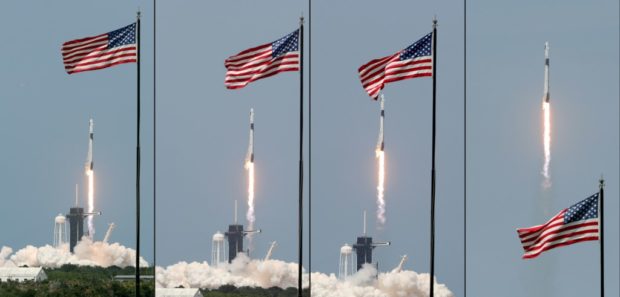US vows to curb China and Russia in space

FILE – This combination of pictures created on May 30, 2020 shows a SpaceX Falcon 9 rocket carrying the Crew Dragon spacecraft lifts off from launch complex 39A at the Kennedy Space Center in Florida. (Photos by Gregg Newton / AFP)
The United States wants to prevent China and Russia from taking control of space and will look to allies for help, according to a new “Defense Space Strategy” unveiled by the Pentagon on Wednesday.
The strategy document was the first since President Donald Trump announced the creation of the new Space Force military arm in December.
“China and Russia present the greatest strategic threat due to their development, testing and deployment of counterspace capabilities,” it said.
“China and Russia each have weaponized space as a means to reduce US and allied military effectiveness and challenge our freedom of operation in space.”
The strategy stressed that the US would strive to maintain superiority in space, in particular protecting GPS satellites on which the military, as well as the emergency services, transport and even financial services, depend.
But China and Russia are developing tools for jamming and cyberattacks that directly threaten US satellites, such as electromagnetic weapons and anti-satellite missiles, Stephen Kitay, the deputy assistant secretary of defense for space policy, told reporters.
China is investing billions of dollars in space and puts many satellites in orbit. In 2007, Beijing also successfully tested a surface-to-air missile strike against a satellite, according to the Pentagon.
In 2017, Russia launched into orbit what it described as an inspection satellite capable of diagnosing problems with a Russian satellite, Kitay said. But the satellite has not moved since its launch and is a worryingly short distance from an American satellite, he added.
Russia has also planned a test launch of its Angara heavy carrier rocket later this year and is pressing ahead with the development of its new intercontinental ballistic missile, the Sarmat.
In 2018, President Vladimir Putin boasted that the Sarmat was one of the new Russian weapons that could render NATO defenses obsolete.
“We are still ahead of them, but we are absolutely at risk with the pace that they are developing these capabilities,” Kitay said. “And these are very serious threats.”
Threat to ‘be prepared for’
The Pentagon’s strategy document stressed that both China and Russia viewed access to outer space as essential to national and military strategy.
Both countries, according to the document, consider space important for modern warfare and the use of weapons in space as a significant means of reducing the military effectiveness of the US and its allies in future wars.
The document also put forth the possibility of a nuclear attack in space. Although the absence of atmosphere would prevent combustion, the detonation of a nuclear weapon would cause a powerful electromagnetic charge that would destroy the electric circuits of all satellites around it, Kitay said.
“That is a threat that we have to potentially be prepared for,” he added.
The US, which is reviving its space exploration program, recently celebrated its first crewed spacecraft flight in nearly a decade, sending two astronauts to the International Space Station in a privately-built capsule.
The strategy document emphasized that the US would “promote burden-sharing with our allies and partners.”
The United States’ closest intelligence allies, the “Five Eyes” group (Australia, Canada, New Zealand, Britain and the US), have been cooperating since 2014 within the Combined Space Operations initiative. France and Germany joined them in February.